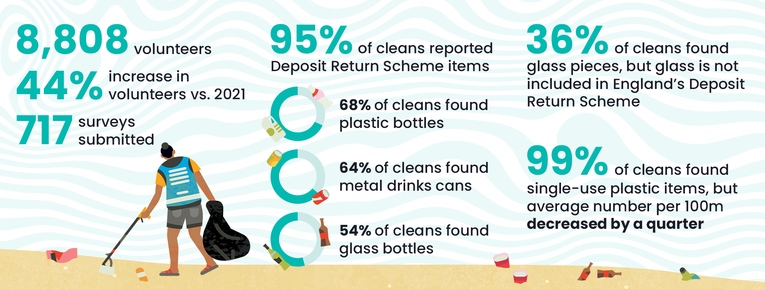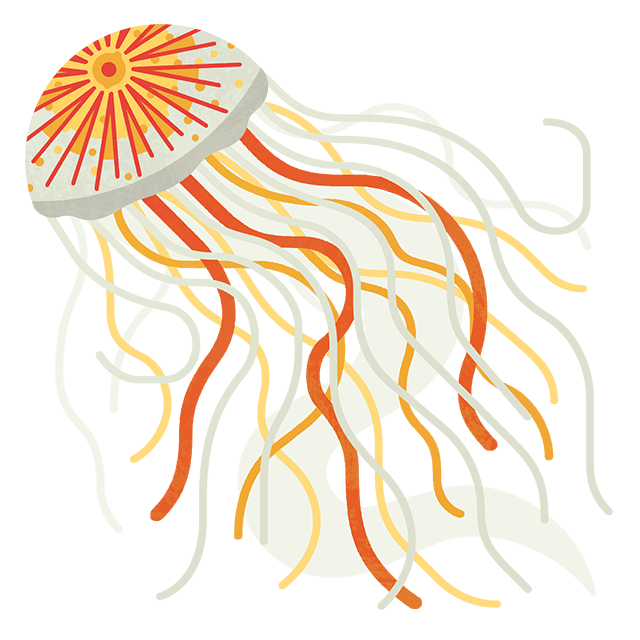
Beachwatch 2022: What you found
A massive thank you to everyone who took part in a beach clean and litter survey last year.
The results are in
An incredible 13,615 volunteers removed litter from their local beaches and submitted over 1,000 litter surveys to us throughout 2022.
From Shetland to Guernsey and Belfast to Brighton, volunteers came together to clean up our beaches and help tackle ocean pollution. They cleared 17,772kgs of litter and provided vital information on the state of our beaches.
Find out about what this vital litter data tells us and the actions we’re taking around the UK and Channel Islands to reduce the amount of harmful plastic and other litter items ending up on our beaches.
What did the UK and Channel Island results show?
1,159
litter surveys submitted
97
miles
of beach cleaned
47
%
increase of volunteers between 2021-2022
A whopping 393,150 litter items were removed from beaches, and on average there were 165 litter items found per 100m of beach.
Litter levels decreasing
The amount of litter recorded on beaches decreased by 11% across the UK and Channel Islands compared to 2021, with each nation seeing a reduction.
Overall, the number of litter items found per 100m decreased by 38% since 2016, when litter levels peaked.
This highlights the effectiveness and influence of policies which reduce pollution, and the hard work of communities and volunteers who have campaigned with us.
Plastic still a problem
Plastic continues to pollute UK and Channel Island beaches, with plastic and polystyrene accounting for 81.5% of all litter recorded. Nine of the top ten litter items were plastic or polystyrene, including plastic packets, bags, wet wipes, drinks bottles, and caps and lids. .
While some of these items, such as drink containers, are expected to decrease with the introduction of Deposit Return Schemes and bans on some single-use items, if we’re to reduce the plastic problem we must look to reusable options and work toward a circular economy.
Drinks-related litter
Glass bottles, plastic bottles and metal drinks cans continue to pollute our beaches and streets, highlighting the importance of urgently introducing effective Deposit Return Schemes.
95
%
of cleans recorded drinks-related litter
64
%
of cleans found metal drinks cans
53
%
of cleans found glass bottles
Litter around the UK
When it comes to reducing beach litter, there isn't a ‘one size fits all’ solution. The political power to drive change, and the types of litter volunteers find, varies around the UK, so we’re continuing to campaign at a national level to reduce some of the worst repeat offenders.
Find out more about what is happening in each nation and what we’re doing to curb marine litter below.
Scotland

Thanks to over 3,000 volunteers, we saw a 15% increase in the number of litter surveys submitted from Scottish beaches, giving us more vital data to use as evidence for policy change.
Despite a slight decrease in the amount of litter reported in Scotland compared to 2021, there’s still a lot to be done to reduce beach pollution, with 160 items found on average per 100m of beach surveyed.
Circular economy
It's clear that Scotland needs to transition from a throwaway society to one which reuses, repairs and refills instead. Hopefully the Circular Economy Bill, which is expected this parliamentary session, will help reduce beach litter.
With plastic and polystyrene cups recorded on 58% of beaches, we hope the Bill will include legislation for a charge on cups, like the carrier bag charge, along with other supportive measures to move to more reusable options.
Wales

This year saw some encouraging trends, with the amount of litter decreasing by 17% in Wales compared to 2021.
Cigarette butts
Although cigarette butts are decreasing, levels are still high in Wales, and they remained the fourth most common items polluting Welsh beaches.
We’re working with ASH Cymru to identify the causes, and solutions, to this growing trend.
In the meantime, volunteers up and down Wales will be playing an important role in protecting our coastline from pollution and collecting vital information on the state of our beaches. If you’d like to join them, you can attend one of our cleans or set up your own.
Single-use plastic
To tackle single-use plastic pollution, Welsh Government passed a bill in December 2022 which bans a range of single-use plastic products and provides a firm foundation to ban other problematic products in the future.
Despite this good news, there is still cause for concern. After being in a clear downward trend since 2015, plastic bags have started to make a reappearance on Welsh beaches, making it into the top ten most widespread items this year.
England

We’ve seen an overall decrease in the amount of litter found on beaches around England (14% less than in 2021). Volunteers have been out in force over the past year, cleaning up beaches and submitting 717 valuable litter surveys – 9% more than in 2021.
- 95% of all cleans reported DRS items, with an average of 16 per 100m.
- 8,883 glass pieces were found on English cleans.
- 54% of surveys recorded glass bottles.
- 1,778 glass bottles were reported on English beaches.
There is support from the public and other environmental organisations to include glass for consistency across the nations’ schemes.
Single-use plastic
While single-use plastic remains a widespread problem, with 99% of cleans reporting single-use plastic items, we are seeing improvements, with the average number of items found per 100m decreasing by a quarter.
We hope the ban of some single-use plastics, which begins in October this year, will help support and accelerate the downward trend.
Northern Ireland

As with other UK nations, Northern Ireland’s beaches are still seeing high rates of plastic litter, including plastic caps and lids, packets, and cigarette stubs.
Unfortunately, there currently isn’t enough survey data to draw statistically significant conclusions from. To change this, we’d love more volunteers in Northern Ireland to get involved and organise beach cleans and litter surveys throughout the year.
"Last year, I set up a Great British Beach Clean event at the wee beach in Portstewart, just round the corner from the iconic Portstewart Strand. This little beach means a lot to me, I spent countless childhood days playing in the rockpools here and trying to bodysurf with my cousins.
"I wasn't sure if anyone else would want to help with the clean-up, but I was quickly proven wrong!
It was so uplifting to see so many new and familiar faces of people who wanted to help out and do their bit for our beautiful coastline - I've already had messages asking when the next one will be!
Alice Moore, Portstewart, County Derry
If you live in Northern Ireland and are interested in running a beach clean, we’d love to hear from you! Just drop us an email at: [email protected]
Channel Islands

The Channel Islands were the only region in the UK to see an increase in the amount of litter found compared to 2021.
Like the other nations, plastic and polystyrene is a major issue on the Channel Islands, with over 71% of all litter found made of the materials. This again highlights the need for an effective circular economy and a move away from single-use items which continue to pollute our beaches.
As with Northern Ireland, we’re currently unable to draw statistical conclusions from the data and would love to get more volunteers from the Channel Islands involved in our beach cleans and litter surveys.
If you’d like to take part and contribute to our ever-growing dataset, please email [email protected].
Get involved!
Share these results with your local politician and ask them what they are doing to help reduce beach litter, or check out more ways below to get involved and help tackle marine pollution.
Join or organise a beach clean
Our beach cleans and litter surveys happen all year round. We have all the resources you need to get started. Check whether there’s one happening near you or organise your own.
Team beach cleans
If you’re looking for a team building or volunteering day for your company, join our experts on a beach clean for a day of fun, whilst doing something worthwhile for the environment. Find out more about team beach cleans.
Source to Sea Litter Quest
In the UK, you‘re never too far from a waterway or sewer, which can carry litter into the ocean and onto our beaches. By taking part in Source to Sea and clearing litter from our streets, you prevent it from polluting our beaches and help build a bigger picture of pollution in UK seas. Find out more inland litter picks.




